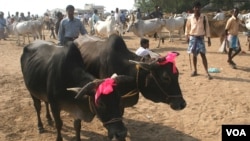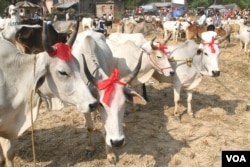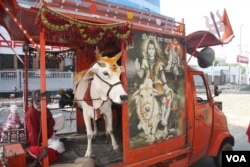Some Islamic scholars and Muslim groups in India have called on Muslims to refrain from sacrificing cows this Eid al-Adha, to avoid hurting the religious sentiments of the country’s Hindu majority that considers the animal holy.
“To maintain peace, Muslims should desist from sacrificing cows, bulls and bullocks during Eid al-Adha. If they do so, it will keep the majority Hindu community happy, help foster communal harmony in the society and send a good message about Islam and its tenets of peace and love to non-Muslims,” Hyderabad-based Islamic scholar Syed Hussain Madani, who launched an anti-cow-slaughter campaign, told VOA.
While the call from Madani has been welcomed by Hindu groups and won support from some Muslims, many others from the minority community believe the traditional sacrifices of cows should continue.
Maulana Sharafat Abrar, a mosque leader in Kolkata, said, “Because of economic and other reasons, Muslims in many areas prefer to sacrifice cows during Eid al-Adha. People should have the right to practice their faith freely. If the slaughtering of cows is not illegal in their region, they should not desist from sacrificing cows.”
In recent years, most Indian states have banned slaughtering cows and some have placed restrictions over beef sales.
That has led to a backlash in some areas among Christians, Muslims and other non-Hindus over the ban of what is a staple food for many.
Some right-wing Hindu groups are pressing for a nationwide ban on the slaughter of cows. In the past year, in several cases, Hindu vigilant groups violently attacked Muslims who were carrying cows, apparently for the purpose of slaughter.
Switch to other animals?
Islamic scholar Madani said given the recent tensions, no Muslim in India should sacrifice any bovine animal during Eid al-Adha at all.
“Prophet Muhammad sacrificed sheep on Eid al-Adha. Muslims should follow him and sacrifice sheep during the festival. They can even sacrifice goat or water buffalo. If Muslims stop sacrificing or slaughtering all types of cows completely, we shall be able to avoid conflicts and our community will be benefited,” Madani said.
Indresh Kumar, a leader of the right-wing Hindu group Rashtriya Swayamsevak Sangh, said if Muslims stop slaughtering cows completely, relations between Hindus and Muslims will improve.
“Those who support slaughter of cows are neither nationalist nor secular. Muslims should not hurt the religious sentiments of Hindus and Jains. We heartily appreciate it that some Muslim leaders are supporting our campaign to put a halt to cow slaughter in the country,” Kumar said.
The campaign also has supporters in Arab Gourakshana Samithi or Arab Cow Protection Society, a Hyderabad-based Muslim organization.
"To build a good spirit of brotherhood among the Hindus and Muslims we have to ensure that there is no trust deficit between the two communities. For the Hindus, the cow is a revered animal. We are happy that an Islamic scholar is supporting our campaign for the sake of peace," Abdullah bin Ali Bahameid, president of the organization, told VOA.
Economic factor
In West Bengal state, where cow slaughter is allowed, taxi driver Noor Alam says his preference for the practice comes down to simple economics.
“People do not like buffalo meat in this region. If I don’t sacrifice cow, goat could be preferable; but, in the case of a goat, the share of sacrifice is limited to only one person. I cannot afford to pay as much as 25,000 rupees ($380) to buy five goats for the five shares of sacrifice from my family,” Alam told VOA.
He says a cow, which can be shared as a sacrifice among up to seven people, would cost about $225.
In a related development, the local High Court in Indian-controlled has Kashmir ordered a stricter implementation of a decades-old anti-cow slaughter ban in that region; but Islamic scholars and Muslim community leaders asked local Muslims to defy the order, saying it directly interferes in the religious affairs of Muslims.
"We shall not tolerate such anti-Muslim law in Muslim-majority Kashmir," said Mirwaiz Umar Farooq, chief Muslim cleric of Jammu and Kashmir state.
For others, the push among some Muslims to end cow sacrifices to reduce tensions with Hindus is indicative of a broader trend that they say has led the Indian state to become more aligned as a Hindu nation.
“Very strangely, the BJP-led government does not bother about the religious sentiments of the Muslims, the largest minority of the country. The government in this constitutionally secular country is pushing for rules that care only for the Hindu sentiments as if India is already a Hindu Rashtra (Hindu nation),” said Mohammed Adeeb, a member of All India Muslim Personal Law Board and former member of parliament.
He said no one religion should dominate the government, but should instead keep India a religiously diverse nation where many groups have learned to live side by side.






